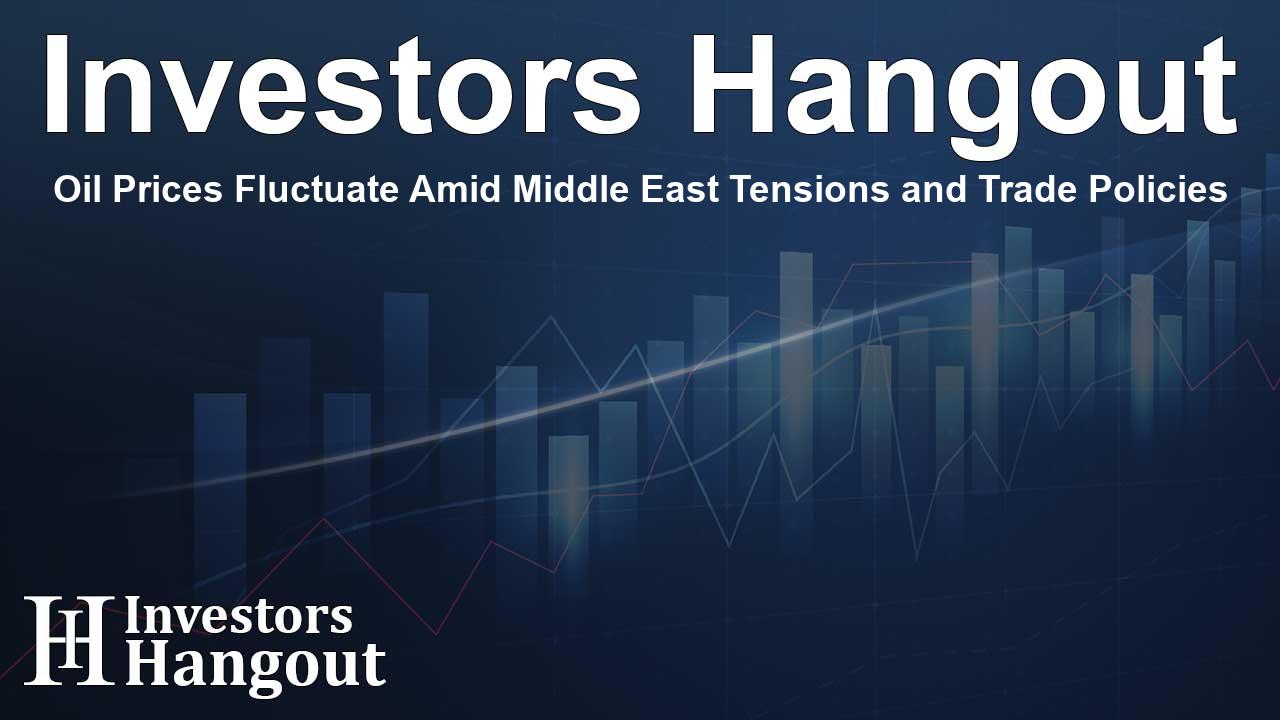Oil Prices Fluctuate Amid Middle East Tensions and Trade Policies

Oil Prices Drop as Traders React to Middle East Developments
Oil prices encountered a downturn during early trading sessions, influenced by various geopolitical and economic factors. Traders reacted to reports suggesting a potential ceasefire between Israel and Hezbollah, leading to a reassessment of risk premiums associated with crude oil. The market showed a notable decrease in the perceived risk of supply disruption, which is often heightened during periods of conflict.
Ceasefire Discussions Impacting Oil Markets
The prospect of a temporary halt in hostilities between Israeli forces and Hezbollah significantly weighed on oil prices. As reports surfaced that negotiations facilitated by U.S. diplomatic efforts could lead to a ceasefire, the market responded accordingly. This potential agreement could mark a pivotal moment in the ongoing tensions in the region, potentially stabilizing oil supplies that are often threatened by such conflicts.
Global Leaders Push for Peace
High-profile leaders including U.S. President Joe Biden and French President Emmanuel Macron have been reported to be advocating for the ceasefire announcement, which could foster a much-needed de-escalation in the area. This anticipated peace could translate into a drop in oil pricing, as traders would feel more secure about supply continuity amidst such geopolitical instability.
Continued Risk Amid Regional Strikes
Despite the hopeful news regarding a ceasefire, recent military actions between Israel and Hezbollah have raised concerns. Both sides launched strikes at one another, suggesting that tensions remain high. Traders remain cautious, understanding that while peace talks are in progress, the situation on the ground can shift rapidly, impacting oil supply and prices significantly.
Economic Pressures from U.S. Trade Policies
In addition to geopolitical tensions, domestic U.S. policies under President-elect Donald Trump have also contributed to the volatility in oil prices. On the same day that Middle East developments impacted the market, Trump announced potential tariffs aimed at China, Canada, and Mexico, which also added pressure on crude prices. The increase in the U.S. dollar's value, stimulated by these tariff threats, makes oil more costly for foreign buyers.
Implications of Dollar Strength
The dollar's rise can diminish international demand for oil, as global buyers may seek to limit their exposure to higher costs. This is particularly relevant for China, the largest importer of oil globally, which could face significant economic pressure due to the new tariffs. Chinese authorities may respond with retaliatory measures, further complicating the trade landscape between the two economic superpowers.
Broader Economic Concerns
The implications of the proposed tariffs are extensive, potentially escalating trade conflicts and generating instability in global markets. Should Beijing react strongly to U.S. tariffs, the ripple effects could lead to substantial shifts in trade flows, which, in turn, could impact oil pricing strategies around the world.
The Market's Ongoing Reaction
As news continues to develop regarding both Middle East tensions and U.S. trade policies, market players are advised to stay informed and cautious. The interplay between geopolitical events and economic measures contributes to market fluctuations, and those involved in trading oil should be well-aware of these influences.
Anticipating Future Movements
Oil traders are approaching these developments with a mix of hope and caution. While the potential for a ceasefire bodes well for market stability, the risk associated with trade tariffs and a resilient dollar casts a shadow over any immediate relief in oil prices. The market will be closely watching how these variables evolve in the coming weeks.
Frequently Asked Questions
Why did oil prices drop recently?
Oil prices have dropped due to reports of a possible ceasefire in the Middle East, which lowers the risk of supply disruptions, along with U.S. tariff threats that strengthen the dollar.
How do trade tariffs affect oil prices?
Trade tariffs can increase the price of oil for foreign buyers, reducing demand. They can also lead to retaliation from trading partners, affecting the broader market.
What role do geopolitical tensions play in oil pricing?
Geopolitical tensions often lead to increased risk premiums on oil as traders anticipate potential supply disruptions, driving prices up during conflicts.
Who are the main players in the Middle East oil market?
Main players include Saudi Arabia, Iran, Iraq, and Kuwait, alongside geopolitical influences from countries engaged in peace talks or military actions.
What should traders look out for in the oil market?
Traders should monitor geopolitical developments, trade policy changes, and economic indicators that could impact supply-demand dynamics and pricing strategies.
About Investors Hangout
Investors Hangout is a leading online stock forum for financial discussion and learning, offering a wide range of free tools and resources. It draws in traders of all levels, who exchange market knowledge, investigate trading tactics, and keep an eye on industry developments in real time. Featuring financial articles, stock message boards, quotes, charts, company profiles, and live news updates. Through cooperative learning and a wealth of informational resources, it helps users from novices creating their first portfolios to experts honing their techniques. Join Investors Hangout today: https://investorshangout.com/
Disclaimer: The content of this article is solely for general informational purposes only; it does not represent legal, financial, or investment advice. Investors Hangout does not offer financial advice; the author is not a licensed financial advisor. Consult a qualified advisor before making any financial or investment decisions based on this article. The author's interpretation of publicly available data shapes the opinions presented here; as a result, they should not be taken as advice to purchase, sell, or hold any securities mentioned or any other investments. The author does not guarantee the accuracy, completeness, or timeliness of any material, providing it "as is." Information and market conditions may change; past performance is not indicative of future outcomes. If any of the material offered here is inaccurate, please contact us for corrections.